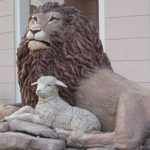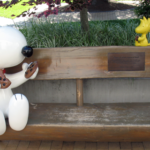On windy summer days, I can’t help but recall cherished childhood memories of kite flying. It’s probably been awhile since most of us have flown a kite. (And it would, no doubt, do all of us a whole lot of good to do some “childish” things like kite flying every now and then!) There’s no doubt about it, kite flying is fun, if not a little frustrating at times. There really is something magical, mystical and even therapeutic about launching a kite and seeing it soar to the heights. As the wind carries it ever upward, the kite seems to come alive with a dance of amazing freedom, spontaneity and creativity.
One lesson you quickly learn in kite flying, however, is that all of that seemingly free, spontaneous, and creative expression is only possible as long as the kite stays securely attached to that kite string, and as long as that kite string stays well-grasped in the hand of the kite flyer.
In many ways, our worship is a little like kite flying. As the uplifting winds of the Holy Spirit take us up to the heights of praise and celebration, we experience tremendous freedom, spontaneity and creativity. But this wonderful freedom in worship can only be appropriately expressed as long as there’s a string that connects us to the Guiding Hand who launches us.
A string of commonality
With all the unending debates about “worship wars,” can we not find some string of commonality in worship that will transcend all the styles? Are there not some grounding principles that can unify all the paradigms?
Gordon Lanthrop, in Holy People: A Liturgical Ecclesiology, outlines some of the commonly held historical and biblical traditions in the worshipping life of the early church. He refers to these “central things” in worship as “book, bath and meal.” These labels refer to the central role of the Bible, baptism and the Lord’s Supper in the life and worship of the early church. To these three Lanthrop adds a fourth, “attentiveness to the poor.” Early worshippers brought alms to their worship that would be distributed to the poor. Bread and wine for the Eucharist celebration would be brought from their own tables. Leftover elements would likewise be given to those who were in need.
Maybe the real question regarding worship today is not about the style of worship. Maybe it’s really not about the particular music preferences of the people. Perhaps the crucial, transcending and uniting question for all worshippers is this: Does worship include a focus on book, bath, meal and appropriate ministries of response like attentiveness to the poor? Maybe these are the common strings that ought to ground all of our worship today. Maybe these are the central things that will set all worship kites flying with great freedom, spontaneity and creativity, but always anchored to some very valuable and much-needed biblical and historical traditions.
Always anchored
Book, bath, meal and attentiveness to the poor ought to remind all of us that our songs and sermons in worship should always reflect a strong, clear—and clearly understood—scriptural basis.
Sign up for our weekly edition and get all our headlines in your inbox on Thursdays
Baptism, however often it is done, should be a true act of worship and given the central focus in worship it once had. Perhaps a little more teaching to candidate and congregation, both before and after baptismal observances, might be in order. How many times have we found baptism placed as some kind of prelude to the service, or simply tacked-on to the end?
Maybe the Lord’s Supper needs to be taken with a little more regularity by us as Baptists, and certainly with a lot more creativity, reverence and spiritual focus. The meal definitely needs to be returned to its once-prominent position as the heart of the worship, not an addendum.
And our people, regardless of the how of their worship, most definitely need to be challenged to the do of their worship, a doing response to worship that is reflected in such passions as a greater attentiveness to the poor and needy.
May our kite-flying worship continue to be filled with the winds of freedom, variety and diversity. But may it be done with a string that binds us, a string that anchors us, a string with which the Great Kite Flyer himself, and he alone, ever guides us to greater heights of true and meaningful worship.
Jim Lemons is director of the master of arts in worship leadership program at Dallas Baptist University.















We seek to connect God’s story and God’s people around the world. To learn more about God’s story, click here.
Send comments and feedback to Eric Black, our editor. For comments to be published, please specify “letter to the editor.” Maximum length for publication is 300 words.